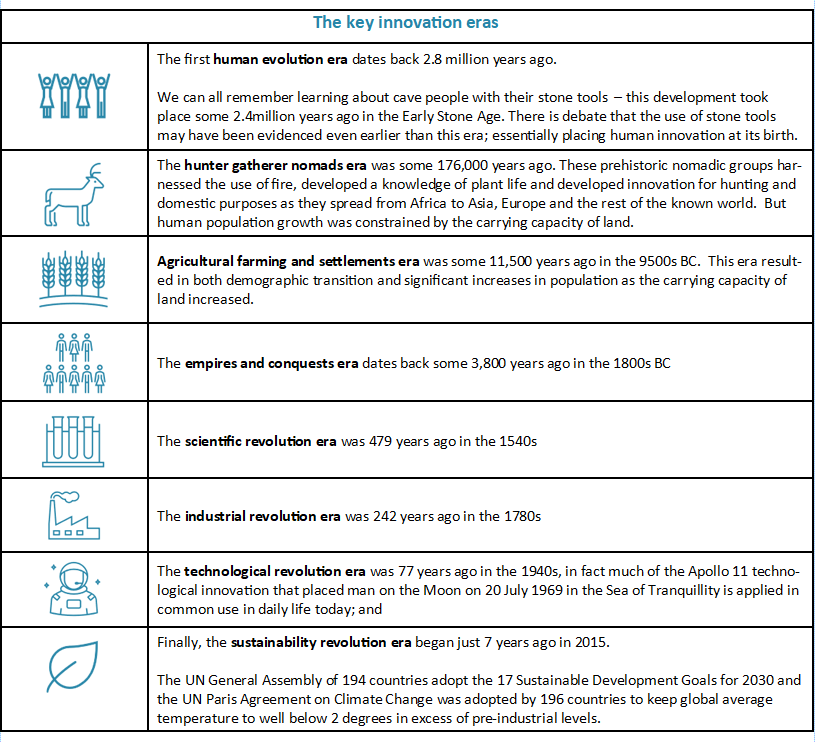Part 1 – Human Innovation has been Intrinsic to our Evolution as a Species
A founding core value we have a passion for demonstrating at ITPEnergised is technology enabled innovation. As well as recently launching our new digitally enabled consulting and digital products platform The Net Zero Accelerator® we have developed an eight-part thought leadership series on human innovation. This series explores the essential place of innovation within our evolution as a human species, the history of innovation in the electricity sector, innovation in the current era of our sustainability revolution and our view of the top five challenges we will face if we are to achieve net zero by at least 2050; where disruptive, not incremental innovation, must play a key role.
We have a long and steeped culture in innovation dating back some 2.4 million years.
There is something intrinsic to humankind that drives us to do things better and more easily whilst taking less time and resource. History can help us learn if we are open minded to doing so. The timeline of our human condition is comprehensively and interestingly laid out:
From a likely big bang some 13.8 billion years ago, through the advent of the earliest water (12,200 million years ago (MYA)), the sun (4,570 MYA), the moon (4,510 MYA), the earth (4,500 MYA), the oceans (4,400 MYA), the earliest single celled life (4,100 MYA), the earliest photosynthesising bacteria (3,500 MYA), the first continents (3,200 MYA), the earliest multicellular life (2,100 MYA), the first oxygenation (2,330 MYA) and the earliest forests (385 MYA), to the first hominoids (25.2 MYA), stone artefacts in Kenya (3.3 MYA), and first human life some 2.8 MYA there has been a lot of change on this little planet we call home.
Within this time period we also see clear records of mass extinction caused by fluctuations in CO2 concentration— disruptive climate change:
- 445 MYA—mass extinctions across 1 million years eliminates ¾ of all species linked to volcanic activity
- 375 MYA—mass extinction across 20 million years, eliminating ⅔ of all species
- 251.9 MYA—largest mass extinction eliminating 9/10 of all species which took 61,000 years due to hot acidifying volcanic CO2 emissions from Siberian Traps
- 201.3 MYA—mass extinction event removing ⅔ of species again linked to volcanic CO2 emissions
- 66 MYA—mass extinction of terrestrial dinosaurs and ¾ of all species linked to a 9 km asteroid in Mexico
And we must reflect on the fact that current Era 21st century emissions are predicted to be on a par with that of the extinction 201.3 MYA. However, we also see the start of human life and its deep association with human discovery we now call innovation. The first periods of recorded human innovation date back to some 2.4 MYA, which translates to roughly 86% of our time on planet earth. We’ve been innovating for a long while now!

Conclusion
Human history shows an intrinsic affiliation towards innovation dating back 2.4 million years ago evidenced by fossilised records. These periods of discovery can be categorised as innovation eras and have enabled meaningful progress for civilisation and for ever increasing human prosperity. This shows that we should be hopeful for progress in the current sustainability revolution.
Download a PDF here of “Part 1 – Human Innovation has been Intrinsic to our Evolution as a Species.”
The full series is listed below :
Part 2 A Brief History Of Innovation in the Electricity Sector
Part 3 The Sustainability Revolution and the Electricity Sector
Part 4 Net Zero Challenge #1 Balancing the Grid
Part 5 Net Zero Challenge #2 Energy Independence
Part 6 Net Zero Challenge #3 The Geopolitics of Supply Chains

